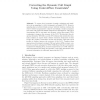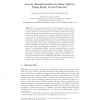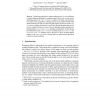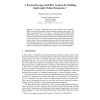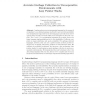CC
2007
Springer
15 years 7 months ago
2007
Springer
Reference counting is a classical garbage collection method. Recently, a series of papers have extended the basic method to drastically reduce its notorious overhead and extend the...
CC
2007
Springer
15 years 7 months ago
2007
Springer
Abstract. To reason about programs, dynamic optimizers and analysis tools use sampling to collect a dynamic call graph (DCG). However, sampling has not achieved high accuracy with ...
101
click to vote
CC
2007
Springer
15 years 7 months ago
2007
Springer
As the amount of data used by programs increases due to the growth of hardware storage capacity and computing power, efficient memory usage becomes a key factor for performance. Si...
CC
2007
Springer
15 years 7 months ago
2007
Springer
Abstract. Recent work has shown that the subtasks of register allocation (spilling, register assignment, and coalescing) can be completely separated. This work presents an algorith...
CC
2007
Springer
15 years 7 months ago
2007
Springer
Optimizing programs for modern multiprocessor or vector platforms is a major important challenge for compilers today. In this work, we focus on one challenging aspect: the SIMD ALI...
CC
2007
Springer
15 years 7 months ago
2007
Springer
DeepWeaver-1 is a tool supporting cross-cutting program analysis and transformation components, called “weaves”. Like an aspect, a DeepWeaver weave consists of a query part, an...
CC
2007
Springer
15 years 7 months ago
2007
Springer
To achieve high resource utilization for multi-issue Digital Signal Processors (DSPs), production compilers commonly include variants of the iterative modulo scheduling algorithm. ...
CC
2007
Springer
15 years 7 months ago
2007
Springer
We present a unification-based, context-sensitive escape and effect analysis that infers lightweight method summaries describing heap effects. The analysis is parameterized on two...
CC
2007
Springer
15 years 7 months ago
2007
Springer
CC
2007
Springer
15 years 7 months ago
2007
Springer
Implementing a new programming language by the means of a translator to an existing language is attractive as it provides portability over all platforms supported by the host langu...

